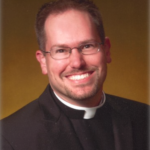4/14/2023
By Christ’s Wounds, We Are Healed
 Fr. Rich Andre, CSP
Fr. Rich Andre, CSP
April 14, 2023
 Fr. Rich Andre, CSP
Fr. Rich Andre, CSP
April 14, 2023
When Jesus appeared to the disciples in the Upper Room on Easter Sunday, was he suffering pain from standing on feet that had been shattered during his crucifixion? Or were Jesus’ wounds merely cosmetic, to help the disciples recognize who he is? I don’t know.
We suffer from all kinds of wounds – personal flaws, damage from sins we’ve committed, harm from sins committed by others against us, and circumstances that aren’t sinful but just make life difficult. It’s a disconcerting but fundamental truth for each of us: whether or not we still suffer from our wounds, they continue to define who we have become.
One of the most influential books I’ve read is The Wounded Healer by Henri Nouwen. The title comes from a Jewish fable: the Messiah sits among the wounded, for the Messiah is himself wounded. The difference between the Messiah and the others is that the Messiah tends to his own wounds in a such way that he can quickly jump up and tend to others, if needed.
As uncomfortable as it sounds, Nouwen argues that all of us need to understand ourselves as wounded healers. Fifty-one years ago, Nouwen wrote this paragraph that seems to describe these past three years of pandemic:
What are our wounds? They have been spoken about in many ways by many voices. Words such as “alienation,” “separation,” “isolation,” and “loneliness” have been used to name our wounded condition. Maybe the word “loneliness” best expresses our immediate experience and therefore most fittingly enables us to understand our brokenness.
The central premise of The Wounded Healer is that loneliness is the fundamental wound that all human beings carry. It’s not caused by sin. It’s a circumstance that results from God creating each of us with an individual identity that is distinct from the rest of the universe.
When we deny our loneliness, we expect that something or someone else can fill up the emptiness inside of us. We will judge every project and relationship by the merits of what we can receive from it. We may become cynical or bitter. If we accept our loneliness, we can spend our lives compassionately supporting one another in this wound we share, rather than viewing others as a means to escape the wound that we think we alone possess.
As Jesus displayed his wounds to the disciples who had so recently betrayed him, saying “Peace be with you… whose sins you forgive are forgiven them, and whose sins you retain are retained,” the disciples probably felt overwhelmed by God’s divine, limitless mercy. As Nouwen quotes from that Jewish fable, “The [Messiah] is coming – not tomorrow, but today, not next year, but this year, not after all our misery is passed, but in the middle of it, not in another place but right here, where we are standing.”
Our wounds give us three things: knowledge of ourselves, compassion for others, and a deeper faith. All three are necessary to have communion with our loving God. May we be so overwhelmed by God’s mercy that we feel compelled to share it with others for the remainder of our days!